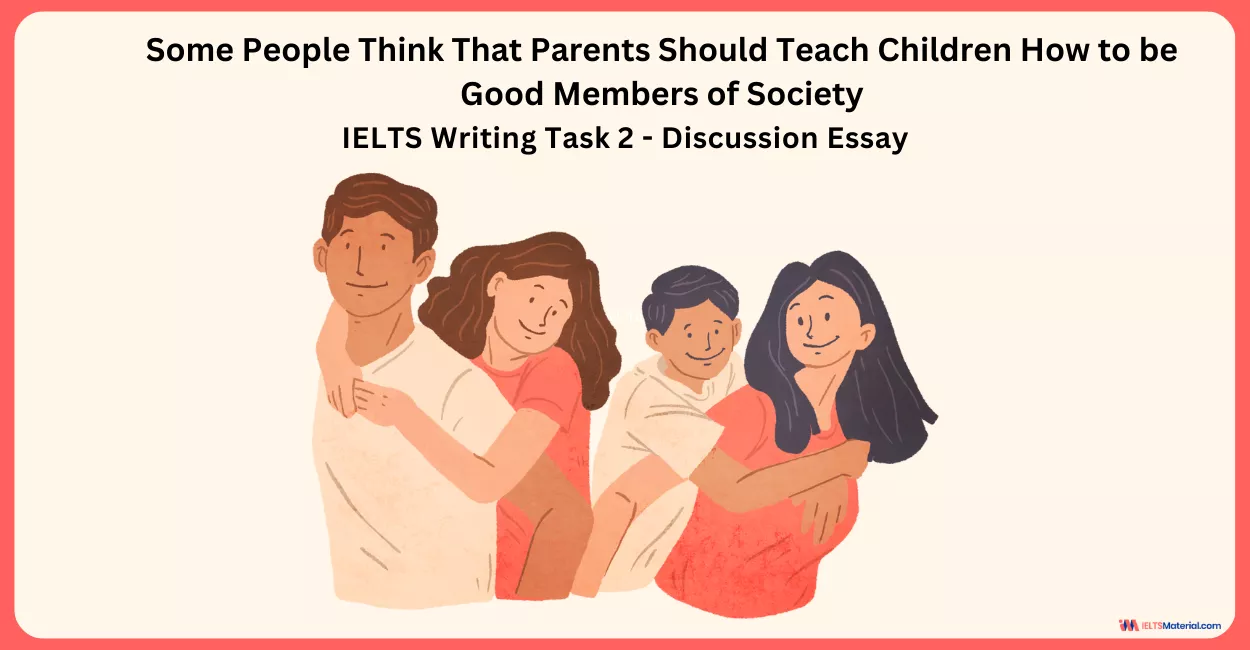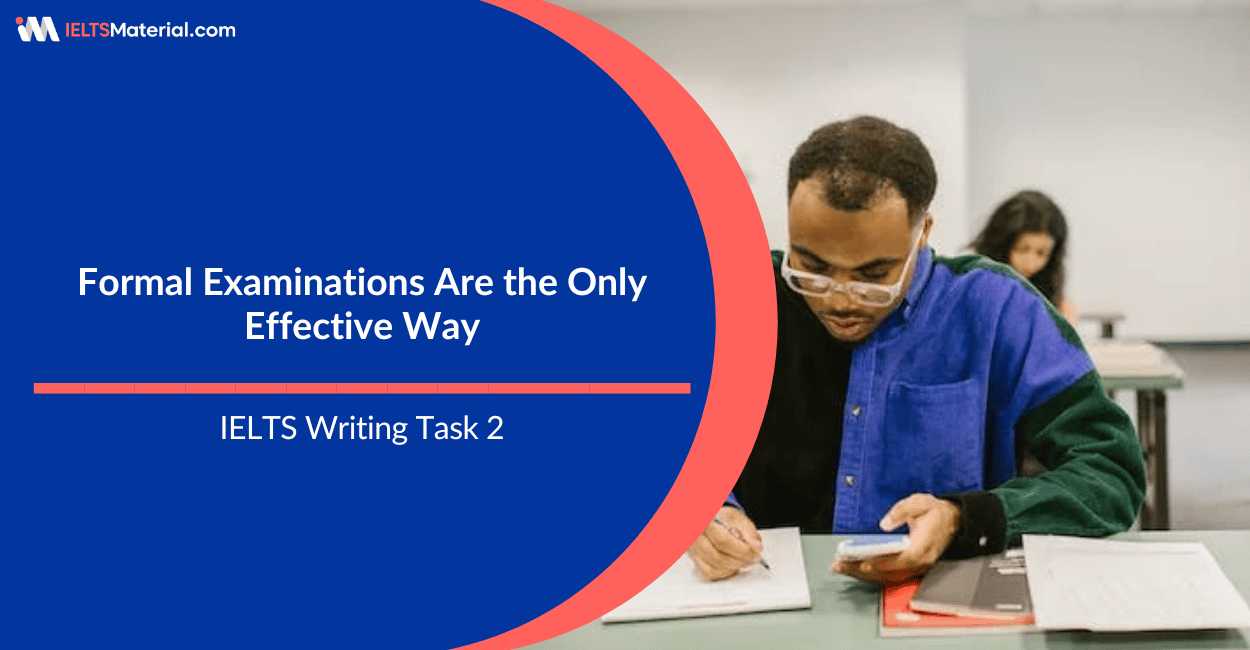Formal Examinations Are the Only Effective Way- Writing Task 2
Table of Contents

Try AI Essay Checker for Instant Band Score
IELTS is one of the English language evaluation exams that millions of candidates take in order to migrate to an English-speaking country. This reflects the importance of the language on a global scale. As a result, the opinion essay titled, Formal Examinations Are the Only Effective Way, a part of Writing Task 2 of the IELTS, is discussed here with an outline and vocabulary that will help you to prepare.
Learn some ways to achieve a band score of 8 for Writing Task 2 and check out the IELTS essay given below.
Steps to Remember
Writing an opinion essay in the IELTS exam requires a structured approach to effectively convey your ideas and arguments. Here are the steps to write an opinion essay for IELTS Writing Task 2:
Step 1: Understand the Question Prompt
Carefully read the essay prompt to ensure you understand the topic, the specific question being asked, and any instructions or guidelines provided.
Step 2: Plan Your Response
Take a few minutes to brainstorm and plan your essay. Consider your opinion on the topic and the key points you want to make. Decide on the structure of your essay, including the introduction, body paragraphs, and conclusion.
Step 3: Write the Introduction
Begin your essay with a clear and concise introduction. Start with a hook or a general statement related to the topic to grab the reader’s attention.
Step 4: Develop the Body Paragraphs
Each paragraph should focus on a single main point or argument. Begin each paragraph with a topic sentence that introduces the main idea. Provide supporting evidence or examples to justify your opinion.
Step 5: Address Counterarguments (Optional)
It’s often beneficial to acknowledge opposing viewpoints in one of your body paragraphs. Present counterarguments briefly and then refute them with strong evidence or reasoning.
Step 6: Write the Conclusion
Summarize your main points and restate your opinion in the conclusion. Avoid introducing new ideas or arguments in the conclusion.
Step 7: Proofread and Edit
Carefully review your essay for grammatical errors, spelling mistakes, and clarity.
Allocate your time wisely during the exam. Spend approximately 40 minutes on Task 2 and use the remaining 20 minutes for Task 1.
Remember that IELTS Task 2 assesses your ability to present and support an argument, so it’s crucial to express your opinion clearly, provide relevant evidence, and maintain a well-structured essay throughout.
Question
You should spend not more than 40 minutes on this task.
Write at least 250 words.
Formal examinations are the only effective way to assess a student’s performance. Continual assessment such as coursework and projects is not a satisfactory way to do this. To what extent do you agree or disagree with this statement?
Outline
Essay Type
Opinion Essay
Introduction
- Introduce the given topic
- I am of the opinion that formal assessment is more effective than coursework and projects.
Body
Paragraph 1: Formal examinations are reliable and prevent external help.
Paragraph 2: They evaluate the cognitive skills of a candidate.
Conclusion
Clearly restate points covered in the essay.
Sample Answer 1 (278 words)
Although assessment has been part and parcel of the education system from time immemorial, it has also caused dissension among groups of people. While one group supports that conventional modes of examination are the best way to judge a person’s knowledge, another group believes that continual involvement is more productive. In my opinion, the former view is more plausible and will be further elaborated on in the upcoming paragraphs of this essay.
To begin with, formal assessment procedures are reliable since the test papers are prepared under strict guidelines and encompass every important skill that needs to be appraised. Moreover, it mandates the presence of the candidate in front of the examiners and restricts external assistance. Additionally, nowadays, different methods of precautions, like frisking, biometrics, CCTV surveillance, etc., are undertaken to prevent cons. Consequently, the merit of the test-taker is evaluated appropriately.
Furthermore, when a candidate takes an examination, their cognitive skills, like attention span, memory, logical reasoning, processing speed, etc., are tested through various types of questions. Besides, questions like poster/slogan creation and story-writing during language exams also enable teachers to analyze a student’s creativity. In short, these modes of evaluation provide an overall idea of the insight and knowledge of a student.
However, unconventional methods like coursework or projects assist students in learning the practical use of the concepts and how they can employ them differently rather than mugging up theories and letting them escape their minds once the exam is over.
In conclusion, nowadays, educational institutions are coming up with different ways to implement innovative ways of taking formal exams, which is not only increasing their pertinence but also maintaining their credibility and superiority.
Vocabulary
- part and parcel (noun)
Meaning: a basic and necessary part of (something)
E.g: Work has become part and parcel of his life.
- immemorial (adjective)
Meaning: for a very long time
E.g: The temple has existed on that land from time immemorial.
- dissension (noun)
Meaning: strong disagreement
E.g: Dissension rose among the students when the government decided to reintroduce offline examinations.
- plausible (adjective)
Meaning: reasonable and likely to be true
E.g: She gave some plausible reasons for accepting the new offer.
- appraised (verb)
Meaning: to judge the quality, success, or needs of someone or something
E.g: The class was appraised on the basis of the new syllabus.
- mandates (verb)
Meaning: require (something) to be done; make mandatory
E.g: The authority mandated that no one can hoard food items.
- con (noun)
Meaning: persuade (someone) to do or believe something by lying to them
E.g: You should be careful about cons nowadays.
- cognitive (adjective)
Meaning: of, relating to, being, or involving conscious intellectual activity (such as thinking, reasoning, or remembering)
E.g: The teacher focused on developing the cognitive skills of her students.
- mugging up (phrasal verb)
Meaning: to study a subject quickly before taking an exam
E.g: Students who are mugging up while studying will be in serious trouble in the future.
- pertinence (noun)
Meaning: the fact or quality of being directly and significantly related to the matter at hand; relevance
E.g: Choose your specialization based on its pertinence in the research field.
Book a free trial session with our IELTS experts to learn more tips and techniques for IELTS.
Sample Answer 2 (262 words)
The effectiveness of assessment methods in evaluating students’ performance has been a subject of debate for years. In this essay, I will argue that formal examinations are more effective than coursework and projects in assessing a student’s performance.
One significant advantage of formal examinations is their reliability. They provide a controlled environment where students are required to demonstrate their knowledge independently. This eliminates the possibility of external assistance or plagiarism, ensuring a fair evaluation. In contrast, coursework and projects can be susceptible to collaboration or outsourcing, making it challenging to ascertain a student’s true abilities. This reliability is crucial in maintaining the integrity of the assessment process.
Formal examinations are designed to evaluate a student’s cognitive skills comprehensively. They assess a student’s ability to think critically, solve problems, and apply knowledge under time constraints. In essence, formal exams measure a student’s aptitude in synthesizing information and making decisions independently. This is particularly important in fields where quick thinking and decision-making are essential, such as medicine or emergency response.
In conclusion, formal examinations offer a level of reliability and a comprehensive evaluation of cognitive skills that coursework and projects often cannot match. While coursework and projects have their merits in assessing other aspects of a student’s abilities, such as research and creativity, they may lack the controlled environment and independence that formal examinations provide. Therefore, it is my firm belief that a balanced approach, incorporating both formal examinations and continual assessment methods, can offer the most effective means of evaluating a student’s performance while addressing the unique aspects of their abilities and knowledge.
Vocabulary
- Assessment (Noun)
Meaning: The process of evaluating or judging someone’s abilities, qualities, or performance.
Eg: The teacher conducted an assessment of the students’ writing skills to determine their progress.
- Comprehensive (Adjective)
Meaning: Covering or including all aspects or elements; thorough and complete.
Eg: The comprehensive study guide helped the students prepare for the final exam.
- Integrity (Noun)
Meaning: The quality of being honest, moral, and upright in one’s actions; the state of being whole or undivided.
Eg: Maintaining the integrity of the scientific research process is essential for credibility.
- Collaboration (Noun)
Meaning: The act of working together with others to achieve a common goal or task.
Eg: The successful completion of the project required close collaboration among team members.
- Outsourcing (Noun)
Meaning: The practice of contracting out certain tasks or functions to external organizations or individuals.
Eg: Many businesses opt for outsourcing their customer support services to save costs.
- Aptitude (Noun)
Meaning: A natural ability or talent for a particular skill or activity.
Eg: Her aptitude for mathematics was evident when she consistently scored the highest in the class.
- Synthesizing (Verb)
Meaning: Combining or integrating various elements or information to create a coherent whole.
Eg: The scientist was skilled at synthesizing complex data into clear and understandable conclusions.
- Independence (Noun)
Meaning: The state of being self-reliant, self-sufficient, or free from external control or influence.
Eg: The university encourages students to develop independence and critical thinking skills during their studies.
Want to Learn More Examples & Tips on how to write Opinion Essays for IELTS Writing Task 2?
Join Our Webinar today!
Practice IELTS Writing Task 2 based on Essay types

Start Preparing for IELTS: Get Your 10-Day Study Plan Today!
Recent Articles

Haniya Yashfeen


Prity Mallick

Kasturika Samanta




Post your Comments